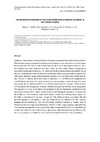Please use this identifier to cite or link to this item:
https://accedacris.ulpgc.es/jspui/handle/10553/19911
| Title: | The maximum warmings of the Pleistocene world climate recorded in the Canary Islands | Authors: | Meco, Joaquín Guillou, Hervé Carracedo, Juan Carlos Lomoschitz, Alejandro Ramos, A. G. Rodríguez-Yánez, José-Juan |
UNESCO Clasification: | 24 Ciencias de la vida 2416 Paleontología 250205 Paleoclimatología |
Keywords: | K-Ar Ages Boundary Sea Fuerteventura Deposits |
Issue Date: | 2002 | Journal: | Palaeogeography, Palaeoclimatology, Palaeoecology | Abstract: | Evidence of the warmest Pleistocene climatic changes is preserved in the eastern Canary Islands. Although the existence of raised fossiliferous marine deposits in northern Gran Canaria has been known since the 19th century, their chronology and significance with regard to past sea levels and temperatures have remained uncertain. Here, we show three marine transgressions recorded by raised marine deposits. The highest (85 m above sea level (masl)) and oldest marine deposit is interbedded in basaltic lava flows and has been dated using both palaeomagnetic and radiometric methods.</p> | URI: | https://accedacris.ulpgc.es/handle/10553/19911 | ISSN: | 0031-0182 | DOI: | 10.1016/S0031-0182(02)00300-0 | Source: | Palaeogeography, Palaeoclimatology, Palaeoecology[ISSN 0031-0182],v. 185, p. 197-210 |
| Appears in Collections: | Artículos |
SCOPUSTM
Citations
61
checked on Jun 8, 2025
WEB OF SCIENCETM
Citations
68
checked on Feb 1, 2026
Page view(s) 5
337
checked on Jan 15, 2026
Download(s)
352
checked on Jan 15, 2026
Google ScholarTM
Check
Altmetric
Share
Export metadata
Items in accedaCRIS are protected by copyright, with all rights reserved, unless otherwise indicated.
